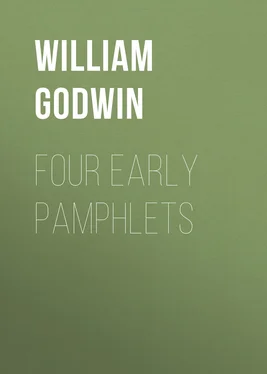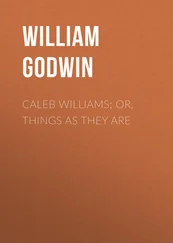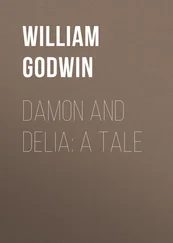William Godwin - Four Early Pamphlets
Здесь есть возможность читать онлайн «William Godwin - Four Early Pamphlets» — ознакомительный отрывок электронной книги совершенно бесплатно, а после прочтения отрывка купить полную версию. В некоторых случаях можно слушать аудио, скачать через торрент в формате fb2 и присутствует краткое содержание. Жанр: foreign_prose, Европейская старинная литература, на английском языке. Описание произведения, (предисловие) а так же отзывы посетителей доступны на портале библиотеки ЛибКат.
- Название:Four Early Pamphlets
- Автор:
- Жанр:
- Год:неизвестен
- ISBN:нет данных
- Рейтинг книги:4 / 5. Голосов: 1
-
Избранное:Добавить в избранное
- Отзывы:
-
Ваша оценка:
- 80
- 1
- 2
- 3
- 4
- 5
Four Early Pamphlets: краткое содержание, описание и аннотация
Предлагаем к чтению аннотацию, описание, краткое содержание или предисловие (зависит от того, что написал сам автор книги «Four Early Pamphlets»). Если вы не нашли необходимую информацию о книге — напишите в комментариях, мы постараемся отыскать её.
Four Early Pamphlets — читать онлайн ознакомительный отрывок
Ниже представлен текст книги, разбитый по страницам. Система сохранения места последней прочитанной страницы, позволяет с удобством читать онлайн бесплатно книгу «Four Early Pamphlets», без необходимости каждый раз заново искать на чём Вы остановились. Поставьте закладку, и сможете в любой момент перейти на страницу, на которой закончили чтение.
Интервал:
Закладка:
But turn we to the administration that succeeded them; who still retained some pretensions to public spirit; and among whom there remained several individuals, whose claim to political integrity was indisputably. Weaker than the ministry of lord Rockingham, to what shifts were they not reduced to preserve their precarious power? These are the men, who have been loudest in their censures of the late coalition. And yet did not they form coalitions, equally extraordinary with that which is now under consideration? To omit the noble lord who presided at the treasury board, and to confine myself to those instances, which Mr. Fox had occasion to mention in treating my subject. Was there not the late chancellor of the exchequer, who has been severest in his censures of lord North, and the lord advocate of Scotland, who was his principal supporter, and was for pushing the American measures, even to greater lengths, than the noble patron himself? Was there not the master general of the ordnance, who has ever gone farthest in his view of political reform, and declaimed most warmly against secret influence; and the lord chancellor, the most determined enemy of reform, and who has been supposed the principal vehicle of that influence? Lastly, was there not, in the same manner, the secretary of state for the home department, who was most unwearied in his invectives against lord Bute; and the right honourable Mr. Jenkinson, who has been considered by the believers in the invisible power of that nobleman, as the chief instrument of his designs.
With these examples of the necessity of powerful support and extensive combination, what mode of conduct was it, that it was most natural, most virtuous, and most wise, for the Rockingham connexion to adopt? I confess, I can perceive none more obvious, or more just, than that which they actually adopted, a junction with the noble commoner in the blue ribbon. At least, from what has been said, I trust, thus much is evident beyond control, that they had just reason to consider themselves abstractedly, as too weak for the support of government.
Still further to strengthen my argument, I affirm, in the third place, that they were not the men, whose services were likely to be called for by the Sovereign. I believe, that this proposition will not be thought to stand in need of any very abstruse train of reasoning to support it. The late events respecting it have been, instead of a thousand arguments. From an apprehension, probably, of the uncourtierliness of their temper, and their inflexible attachment to a system; it seems to appear by those events, that the sovereign had contracted a sort of backwardness to admit them into his councils, which it is to be hoped, was only temporary. It was however such, as, without any other apparent cause to cooperate with it, alone sufficed to delay the forming an administration for six weeks, in a most delicate and critical juncture. Even the union of that noble person, who had been considered as his majesty's favourite minister, did not appear to be enough to subdue the averseness. However then we may hope, that untainted virtue and superior abilities, when more intimately known, may be found calculated to surmount prejudices and conciliate affection; it seems but too evident, that in the critical moment, those men, by whom alone we have endeavoured to prove, that the country could be well served, would not voluntarily have been thought on.
But it does not seem to have been enough considered, at what time the coalition was made. The Rockingham connexion, along with thousands of their fellow citizens, who were unconnected with any party, were induced, from the purest views, to disapprove of the late treaty of peace. The voting with the friends of lord North upon that question, was a matter purely incidental. By that vote however, in which a majority of the commons house of parliament was included, the administration of lord Shelburne was dissolved. It was not till after the dissolution was really effected, that the coalition took place. In this situation something was necessary to be done. The nation was actually without a ministry. It was a crisis that did not admit of hesitation and delay. The country must, if a system of delay had been adopted, have immediately been thrown back into the hands of those men, from whom it had been so laboriously forced scarce twelve months before; or it must have been committed to the conduct of persons even less propitious to the cause of liberty, and the privileges of the people. A situation, like this, called for a firm and manly conduct. It was no longer a time to stoop to the yoke of prejudice. It was a time, to burst forth into untrodden paths; to lose sight of the hesitating and timid; and generously to adventure upon a step, that should rather have in view substantial service, than momentary applause; and should appeal from the short-sighted decision of systematic prudence, to the tribunal of facts, and the judgment of posterity.
But why did I talk of the tribunal of facts? Events are not within the disposition of human power. "'Tis not in mortals to command success." And the characters of wisdom and virtue, are therefore very properly considered by all men, who pretend to sober reflection, as independent of it. If then, as I firmly believe, the coalition was founded in the wisest and most generous views, the man, that values himself upon his rational nature, will not wait for the event. He will immediately and peremptorily decide in its favour. Though it should be annihilated to-morrow; though it had been originally frustrated in its views, respecting the continuation of a ministry; he would not hesitate to pronounce, that it was formed in the most expansive and long-sighted policy, in the noblest and most prudent daring, in the warmest generosity, and the truest patriotism.
But it will be said, a coalition of parties may indeed be allowed to be in many cases proper and wise; but a coalition between parties who have long treated each other with the extremest rancour, appears a species of conduct, abhorrent to the unadulterated judgment, and all the native prepossessions of mankind. It plucks away the very root of unsuspecting confidence, and can be productive of nothing, but anarchy and confusion.
In answer to this argument, I will not cite the happy effects of the coalition between parties just as opposite, by which Mr. Pitt was introduced into office in the close of a former reign. Still less will I cite the coalition of the earl of Shelburne, with several leaders of the Bedford connexion, and others, whose principles were at least as inimical to the popular cause, and the parliamentary reform, as those of Lord North; and the known readiness of him and his friends to have formed a junction with the whole of that connexion. I need not even hint at the probability there exists, that the noble lord then in administration, would have been happy to have formed the very coalition himself, which he is willing we should so much reprobate in another. I need not mention the suspicions, that naturally suggested themselves upon the invincible silence of his party, respecting the mal-administration of lord North, for so long a time; and their bringing forward the singular charge of fifty unaccounted millions at the very moment that the coalition was completed. I should be sorry to have it supposed, that the connexion I am defending, ever took an example from the late premier, for one article of their conduct. And I think the mode of vindicating them, not from temporary examples, but from eternal reason, as it is in itself most striking and most honourable, so is it not a whit less easy and obvious.
Let it be remembered then, in the first place, that there was no other connexion, sufficiently unquestionable in their sincerity, and of sufficient weight in the senate, with which to form a coalition. The Bedford party, had they even been willing to have taken this step in conjunction with the friends of lord Rockingham, were already stripped of some of their principal and ablest members, by the arts of lord Shelburne. Whether these ought to be considered in sound reason, as more or less obnoxious than lord North, I will not take upon me to determine. Certain I am, that the Scottish connexion were, of all others, the most suspicious in themselves, and the most odious to the people. The only choice then that remained, was that which was made. The only subject for deliberation, was, whether this choice were more or less laudable than, on the other hand, the deserting entirely the interests of their country, and leaving the vessel of the state to the mercy of the winds.
Читать дальшеИнтервал:
Закладка:
Похожие книги на «Four Early Pamphlets»
Представляем Вашему вниманию похожие книги на «Four Early Pamphlets» списком для выбора. Мы отобрали схожую по названию и смыслу литературу в надежде предоставить читателям больше вариантов отыскать новые, интересные, ещё непрочитанные произведения.
Обсуждение, отзывы о книге «Four Early Pamphlets» и просто собственные мнения читателей. Оставьте ваши комментарии, напишите, что Вы думаете о произведении, его смысле или главных героях. Укажите что конкретно понравилось, а что нет, и почему Вы так считаете.












